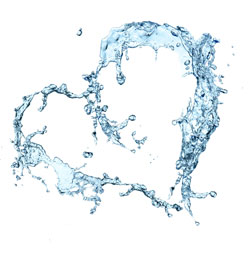
Water and How It Affects The Rick Level for Coronary Heart Disease
Since 1999, some research are conducted 1999 to indicate that there is a good correlation between fluid intake level and coronary heart disease. Whole blood viscosity, plasma viscosity, and blood fibrinogen level are considered to be independent risk factors for coronary heart disease, and they all tend to be elevated by dehydration. Therefore, healthy people who drink adequate levels of plain water generally keep their hydration level up and have a reduced risk of dying from a heart attack in comparison to people who do not drink adequate water.
Water intake and risk of coronary heart disease

The clearest and most consistent association with fatal coronary heart disease was found with water intake. Among men, univariate analysis showed a dose-response relation (p < 0.001). Compared with those drinking two or fewer glasses of water daily (low), subjects drinking from three to four glasses (medium) and five or more glasses (high) had relative risks of 0.65 (95 percent confidence interval (CI): 0.40, 1.05) and 0.46 (95 percent CI: 0.28, 0.75), respectively. Among women, the relative risks of drinking medium and high levels of water were 0.54 (95 percent CI: 0.32, 0.90) and 0.59 (95 percent CI: 0.36, 0.97), respectively. The associations remained virtually unchanged when adjusting for traditional risk factors as well as for fluids other than water, energy intake, diet, exercise, and when weight replaced body mass.
Why may coronary heart disease risk be increased with a higher intake of fluids other than water? Several mechanisms can be postulated. Caffeinated beverages are mild diuretics and thus may raise blood viscosity. High energy drinks such as juices and regular sodas have osmolalities between 556 and 836 mOsm/kg. Their consumption causes a net movement of fluid from the vascular system into the intestinal lumen, resulting in a rapid elevation in blood viscosity after consumption.
Other fluids probably have a similar impact as long as they do not contain excessive levels of sugar, salt, or other chemicals that the body excretes in water, thus reducing the body’s water content. Although many people could and probably should drink more water than they do, drinking excessive levels of water can flush away essential salts from the body and lead to potential health problems.





